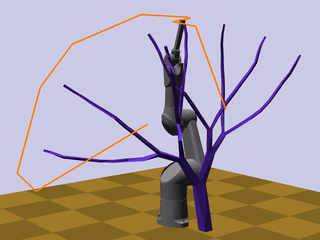Awesome
SemiInfiniteOptimization
Kris Hauser, with contributor Mengchao Zheng
Latest update: 7/26/2020
kkhauser@illinois.edu
This package contains code accompanying the paper "Semi-Infinite Programming for Trajectory Optimization with Nonconvex Obstacles" by K. Hauser, in Workshop on the Algorithmic Foundations of Robotics (WAFR), 2018.



File structure
├── data World, robot, and object files for running the example code
| └─── ...
├── geomopt.py A geometry - geometry collision optimization example program
├── README.md This file
├── resources Path files for running the trajectory optimization example code
| └─── ...
├── robotplanopt.py A robot motion planning + trajectory optimization example program
├── robotposeopt.py A robot pose - geometry collision optimization example program
├── robottrajopt.py A robot trajectory optimization example program
├── semiinfinite/ The core Python module
| ├── geometryopt.py SIP code for collision-free constraints between geometries, for objects, robot poses, and robot trajectories.
| ├── __init__.py Tells Python that this is a module
| ├── objective.py Generic objectives for optimization problems
| ├── planopt.py Runs a hybrid sampling-based + trajectory optimization motion planner
| └── sip.py Generic semi-infinite programming code
└── utils
└─── SDF Plotting.ipynb A helper to plot Signed Distance Functions dumped in .mat format (see flag DUMP_SDF=True)
Dependencies
This package requires
-
Numpy/Scipy
-
OSQP for quadratic program (QP) solving. OSQP can be installed using
pip install osqp
Other solvers might be supported in the future.
- The Klampt 0.8.x Python API (https://klampt.org) to be installed.
pip install klamptmay work.
Basic usage:
Copy the semiinfinite folder to your desired project, or create a setup.py to install this into your Python site-packages, if you prefer. The following code optimizes the pose of a rigid objects so that it's collision free with respect to another object.
from __future_ import print_function
from klampt import *
from semiinfinite.geometryopt import PenetrationDepthGeometry,optimizeCollFree
from semiinfinite.sip import SemiInfiniteOptimizationSettings
# ... TODO: setup Klamp't Geometry3D or RigidObjectModel objects obj1 and obj2 here ...
# For example,
# obj1 = Geometry3D()
# obj1.loadFile("data/cube.off")
# obj2 = Geometry3D()
# obj2.loadFile("data/m797.off")
# Define a volumetric grid resolution
gridres = 0.05
# Define a point cloud resolution
pcres = 0.02
geom1 = PenetrationDepthGeometry(obj1,gridres,pcres)
geom2 = PenetrationDepthGeometry(obj2,gridres,pcres)
# ... TODO: setup appropriate object transforms
geom1.setTransform(obj1.getTransform())
geom2.setTransform(obj2.getTransform())
# The optimizer will optimize the transform of object 1 with object 2 fixed.
Tinit = obj1.getTransform() # Initial transform
Tdes = None # Desired transform. This can be None, in which case the optimizer assumes Tdes=Tinit
# Run the optimizer with default settings.
# You can pass SemiInfiniteOptimizationSettings object into the settings argument if you want to
# configure the solver.
Tcollfree,trace,cps = optimizeCollFree(geom1,geom2,Tinit,Tdes,verbose=0,settings=None)
# Tcollfree is the solved rigid transform, in klampt.math.se3 format.
# You may want to test the soluiton for collision.
geom1.setTransform(Tcollfree)
if geom1.distance(geom2) < 0:
print("Couldn't solve for a collision free configuration")
# If you want to update the Klamp't object, call this...
obj1.setTransform(*Tcollfree)
Running demos
The example files in data/*.xml assume the Klampt-examples folder is one level up from this folder. If your Klampt-examples folder is somewhere else, change the paths accordingly.
In geomopt.py and robotposeopt.py, you can drag around the object transform and observe the results of the optimization.
Basic geometry - geometry collision testing
python geomopt.py data/cube.off
python geomopt.py data/cube.off data/m797.off
python geomopt.py data/cube.off data/scene2_1.pcd
Robot pose optimization testing:
python robotposeopt.py data/tx90_geom_test.xml
python robotposeopt.py data/tx90_geom_test2.xml
python robotposeopt.py data/tx90_geom_test3.xml
Trajectory optimization testing
python robottrajopt.py data/tx90_geom_test2.xml
This example uses resources/robottrajopt_initial.path as the initial path. If this file doesn't exist, you can create your own path by editing the configurations as prompted.
Optimal motion planning testing
python robotplanopt.py data/tx90_geom_test2.xml
This example asks you to define a start and goal configuration, and then you may choose to run various optimizing motion planners from the Actions menu.
Version history
7/26/2020 - Updated for Python 2/3 compatibility. Added motion planning examples. Improved line search method, with better scoring function (courtesy of Mengchao Zheng.) Fixed occasional crash in trajectory optimizer.
10/30/2018 - First release